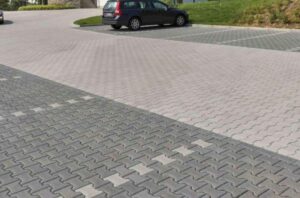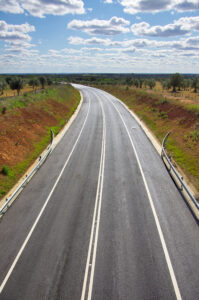How New Jersey’s Weather Impacts Asphalt Paving
New Jersey’s weather brings a unique set of challenges for asphalt surfaces. While our four-season climate is part of what makes the Garden State beautiful, the combination of freeze-thaw cycles, heavy rainfall, snow, ice, and humid summers can take a toll on driveways, parking lots, and roads.
For homeowners, a cracked driveway is both unsightly and unsafe. For property managers, potholes in a parking lot create liability concerns. And for municipalities, extreme temperature swings and moisture can shorten the lifespan of vital roadways.
Understanding how New Jersey’s climate affects asphalt paving is essential. With over 15 years of experience serving communities across the state, NJPave has mastered climate-specific paving solutions. As a trusted New Jersey paving contractor, we know how local weather impacts pavement—and how to build durable surfaces that last.
New Jersey’s Climate Challenges for Asphalt Paving
New Jersey’s climate is diverse—ranging from hot, humid summers to freezing winters, and everything in between. Unlike drier regions, we deal with year-round moisture and wide seasonal temperature swings, each affecting pavement differently:
- Freeze-Thaw Cycles: During winter, freezing and thawing cause pavement to expand and contract, leading to cracks and potholes.
- Snow & Ice: Frequent plowing, salting, and de-icing treatments wear down surfaces and accelerate deterioration.
- Humidity & Rain: Moisture softens asphalt binders and can seep beneath the surface, weakening the base.
- Temperature Extremes: Hot summers and cold winters test the flexibility and structure of asphalt.
- Drainage & Runoff: Heavy spring rains, tropical remnants, and melting snow challenge drainage systems and can lead to erosion or base damage.
These conditions make New Jersey one of the toughest climates for asphalt durability. At NJPave, our years of local experience ensure every pavement is designed to withstand these unique stresses.
High Temperatures and Asphalt Paving Quality
New Jersey’s summer heat and humidity can take a serious toll on pavement quality. Between strong sunlight, heavy rain, and temperature swings, asphalt performance can decline if not properly installed and maintained.
- Heat Expansion & Softening: Asphalt expands in extreme heat and softens under heavy traffic, leading to surface ruts.
- Moisture & Humidity: Summer humidity and rain allow water to penetrate the surface and weaken the base.
- UV Damage: Prolonged sunlight oxidizes asphalt, fading it from deep black to gray and making it brittle.
- Freeze-Thaw Cracking: Moisture from summer storms seeps into cracks, then freezes in winter—widening them over time.
- Drainage Challenges: Heavy summer downpours and coastal storms can overwhelm drainage systems, accelerating erosion.
NJPave designs asphalt mixes and installation methods specifically for New Jersey’s temperature and humidity conditions—ensuring long-lasting, high-performance pavement.
Installation Challenges in Hot Weather
New Jersey’s warm, humid summers create both opportunities and challenges for paving. While the warm weather allows asphalt to remain workable, high humidity and extreme heat can impact installation quality.
- Temperature Control: Fresh asphalt is laid at 250–300°F. Our crews carefully plan installations for cooler morning hours to ensure proper compaction and prevent softening.
- Mix Selection: NJPave uses polymer-modified asphalt designed to handle heat, humidity, and heavy traffic while maintaining flexibility for cold months.
- Curing Time: In hot and humid weather, asphalt may take 48–72 hours to cure fully. We protect new surfaces from traffic until they reach the proper strength.
- Scheduling: To ensure best results, we schedule paving projects during moderate seasonal windows—spring and fall are often ideal in New Jersey.
By tailoring mix designs and timing to local conditions, NJPave guarantees smooth, strong, and long-lasting pavement performance.
Cold Weather Considerations in New Jersey
Cold weather is one of the biggest challenges for asphalt paving in New Jersey. Freezing temperatures, snow, and ice all impact the paving process and pavement longevity.
- Threshold Temperatures: Asphalt paving shouldn’t be done when air or ground temperatures are below 50°F. We schedule most major projects during spring and fall to ensure proper compaction and durability.
- Short Working Time: In cold air, asphalt cools quickly—reducing time for spreading and compaction. Our crews prepare equipment and materials in advance to work efficiently at the right temperature.
- Warm-Mix Asphalt: For cooler conditions, we use warm-mix technology, which allows paving at lower temperatures without sacrificing quality.
- Freeze-Thaw Damage: Repeated freeze-thaw cycles cause cracks and potholes if moisture seeps into the pavement. We prevent this through proper grading, sealing, and material choice.
Even outside the peak of summer, NJPave can deliver high-quality results thanks to our careful planning and expertise in New Jersey’s cold-weather paving conditions.
Moisture & Humidity Challenges for Asphalt Paving
Moisture is one of the most damaging elements for asphalt in New Jersey. Between heavy rainfall, melting snow, and coastal humidity, managing water is essential for long-lasting pavement.
- Base Layer Moisture: Asphalt laid on a wet or unstable base leads to stripping and weak bonding. NJPave ensures all sub-bases are fully dry and compacted before paving begins.
- Freeze-Thaw Impact: Moisture that infiltrates cracks freezes in winter, expands, and widens damage over time. We use sealcoating and crack sealing to protect surfaces.
- Curing Efficiency: Cooler, humid air affects curing speed. Our crews adjust their workflow to ensure proper compaction and smooth finishes before the mix sets.
- Seasonal Planning: Spring and fall often offer the best balance of temperature and moisture for high-quality asphalt paving in New Jersey.
Our team knows how to navigate the state’s unpredictable humidity and weather—ensuring your asphalt stays strong, stable, and sealed.
Rain and Asphalt Paving: Dealing with New Jersey’s Downpours
New Jersey experiences frequent rainfall, thunderstorms, and nor’easters—all of which impact paving projects and long-term pavement life.
Here’s how NJPave manages these challenges:
- No Paving on Wet or Frozen Surfaces: We never lay asphalt on wet or frozen ground, as it leads to poor adhesion and early deterioration.
- Sudden Weather Shifts: Our teams closely monitor forecasts and work in manageable sections to protect in-progress paving from unexpected storms.
- Drainage Design: Proper grading and slope design ensure water flows away from the pavement, preventing pooling and erosion.
- Moisture Management: Even with great drainage, small cracks can let water in. Our maintenance programs include routine sealcoating and crack repair to prevent long-term damage.
- Concrete Work: Rain also affects concrete. We protect fresh concrete with coverings and curing compounds to prevent moisture imbalance and ensure lasting strength.
From summer rainstorms to winter snowmelt, NJPave’s weather-focused planning ensures your pavement stands the test of time.
Climate-Specific Solutions by Experienced Professionals
New Jersey’s weather demands an expert approach to asphalt paving. From hot, humid summers and heavy rainfall to snowy winters, only the right combination of materials, timing, and experience can ensure lasting results. That’s where NJPave stands out.
With over 15 years in the paving industry, we specialize in climate-smart paving solutions that perform in New Jersey’s challenging environment.
Our Proven Approach Includes:
1. Custom Asphalt Mixes for New Jersey Conditions
We use asphalt engineered to handle the state’s temperature swings, high humidity, and freeze-thaw cycles. Our polymer-modified binders resist softening in summer and cracking in winter—perfect for residential, commercial, and municipal projects.
2. Prepared Crews and Equipment
Our teams are equipped with state-of-the-art rollers, spreaders, and compactors to complete paving quickly and effectively—even when the weather turns unpredictable.
3. Strategic Scheduling
Timing is everything. We plan projects around New Jersey’s seasonal patterns—often early mornings in summer or midday in spring and fall—to achieve optimal paving conditions and consistent quality.
4. Expert Site Preparation
Every long-lasting pavement starts with a solid foundation. NJPave ensures the subgrade is compacted, graded, and moisture-free before asphalt is laid.
5. Local Knowledge & Planning
We understand the difference between a passing rain shower and a storm system that’ll stall your project. Our local expertise ensures efficient decisions and minimal downtime.
6. Long-Term Protection
We recommend UV-resistant sealcoating and routine crack sealing to protect against New Jersey’s harsh sun, rain, and snow—keeping your pavement looking and performing great for years.
Proven Results Across New Jersey
From residential driveways in Bergen County to commercial parking lots in Middlesex and municipal roads along the Shore, NJPave’s work speaks for itself. Our projects have withstood New Jersey’s toughest weather while maintaining strength, appearance, and safety.



